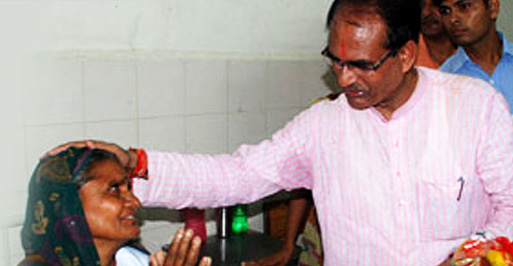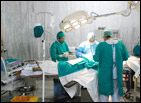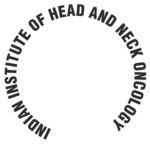Breast Cancer Surgery Camp on 30th & 31st August 2012
This activity focused on door-to-door detection of suspected breast cancer cases in 5861 villages of 34 blocks in the 6 districts of the Ujjain Division in Madhya Pradesh.

The day after the camp, the Honourable Chief Minister of Madhya Pradesh, Shri Shivraj Singh Chauhan, made a special visit to Ujjain to meet the operated patients.
 It started on 21st July, with the Chief Minister of the state announcing programmes against women’s cancers. The next day, the Ujjain Commissioner solicited the support of the Foundation in the implementation of this programme. It was mutually decided to focus on breast cancers, in view of their increasing numbers in India. On August 3, at a meeting of all Chief Medical Health Officers, Civil Surgeons, deputy directors and Joint Director Health of the division, the modalities for the implementation of the programme were discussed. At the August 9 meeting with the Collectors of the division, the Commissioner exhorted them to ensure participation of all concerned to ensure a successful programme. From 18th to 20th August, training programmes were organised for grass root level workers (khand chiktsa adhikari, mahila and baal vikas pariyojana adhikari, anganwadi paryavekshak, ANM, anganwadi karyakarta and Asha karyakarta). Then started the door-to-door identification process that resulted in 1932 women being sent to the Community Health Centres, where the doctors did preliminary screening and of this number, 625 were sent to district hospitals. The district hospital level doctors did further screening and 335 women were sent to the hospital at the divisional level. There the Foundation’s team of doctors examined and did special tests on 100 clinically suspicious cases. Finally, 50 women were slated for breast surgery on 30th & 31st August. A multi-specialty team of the Foundation, adept at performing supra major surgeries at district hospitals did 41 surgeries including 21 radical, super major operations.
It started on 21st July, with the Chief Minister of the state announcing programmes against women’s cancers. The next day, the Ujjain Commissioner solicited the support of the Foundation in the implementation of this programme. It was mutually decided to focus on breast cancers, in view of their increasing numbers in India. On August 3, at a meeting of all Chief Medical Health Officers, Civil Surgeons, deputy directors and Joint Director Health of the division, the modalities for the implementation of the programme were discussed. At the August 9 meeting with the Collectors of the division, the Commissioner exhorted them to ensure participation of all concerned to ensure a successful programme. From 18th to 20th August, training programmes were organised for grass root level workers (khand chiktsa adhikari, mahila and baal vikas pariyojana adhikari, anganwadi paryavekshak, ANM, anganwadi karyakarta and Asha karyakarta). Then started the door-to-door identification process that resulted in 1932 women being sent to the Community Health Centres, where the doctors did preliminary screening and of this number, 625 were sent to district hospitals. The district hospital level doctors did further screening and 335 women were sent to the hospital at the divisional level. There the Foundation’s team of doctors examined and did special tests on 100 clinically suspicious cases. Finally, 50 women were slated for breast surgery on 30th & 31st August. A multi-specialty team of the Foundation, adept at performing supra major surgeries at district hospitals did 41 surgeries including 21 radical, super major operations.
The project resulted in: (i) 41 women previously unaware of their condition receiving the necessary treatment free of cost (ii) capacity enhancement of 9872 health workers, (iii) saving of precious public money (Rs. 43 lakh), and finally and perhaps most significantly (iv) proving the efficacy of this model and its replicability at a national level.
The state government has decided to ask other districts of the state to carry out programmes based on the Ujjain model!
It must be mentioned here that the success of a project such as this depends on the conviction with which the leadership conducts the programme and there is no doubt that the credit goes to Mr. Arun Pandey, Commissioner, Ujjain Division, for steering this programme with dynamism and commitment.
